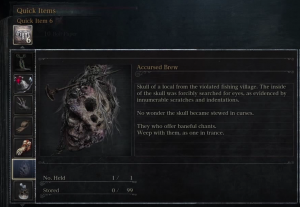This week in Story Lab we looked at a variety of issues surrounding story, a major point being linearity as the “standard” or “default” way to construct a story and alternate ways it could be done. Another topic raised in one of the readings was “Database as a story”, I didnt fully understand this and I may be misinterpertting it, but these two things (and even the stuff about agency in the other reading) immidetly made me think of From Software’s “Soul’s” games (and Bloodborne).
These video games which include Demon’s Souls (2009), Dark Souls (2011), Dark Souls 2 (2014) and Bloodborne (2015), and are infamous for their legendary difficulty (which in my opinion is vastly overstated) but also have a unique narrative style that delivers their dark and twisted fantasy stories in a very data-base style method.

The plot of the game’s is very simple, in Demon’s Souls you are simply tasked with killing Demons until you are powerful enough to lull the Old One back to Slumber and save the kingdom of Bolataria. In Dark Souls you are tasked with ringing the Two Bells of Awakening, and then collecting 4 powerful Souls for a Snake that looks like Steve Buscemi and then either lighting yourself on fire to serve as 1000 years of fuel for the world or no lighting yourself on fire and letting the world be consumed by darkness.

Relatively simple plots which act mostly as reasons to complete the gameplay objectives (killing each Arch Demon, or finding both Bells of Awakening etc…) but the games contain vast amounts of story and lore that explains the history of the world, who characters you meet are and WHY you are completing your simple, yet vague objectives.
This story is not intrusive in any way, and a player could quite easily finish the game without knowing who anyone was or why they were there, but if you care to look for it a rich backstory for almost everything you can find is there, in various degree’s of obsecrerity.
Every item you find in the game (Weapons, Spells, Keys, Clothing etc…) has a description when viewed in the games inventory screen, usually explaining what the item is and what it does, but it often is accompanied with more information that expands on the story, giving insight onto events or characters.
This item from Bloodborne gives a short summary of events that took place that the player has no other way of figuring out, and gives a clearing understanding of what happened to the Fishing Villiage it is found in. Items which contain “lore” are scattered all over the game(s) and to understand who people are, what happened in the past and more. Once picked up all this infomation can be viewed at one’s lesiure from the Inventory menu, but the order in which a player finds them can vary wildly, as a player you can tackle different areas of the game non-linarly, thus certain items will be found in a certain order which could temporarily lead to an interpretation of events that gets revised when more infomation is found, or a player could miss an item entirely and never read that infomation (or just forget to read it after picking it up). This means that different people might have different interpretations of events in the story because they dont have the full picture.
The story becomes almost an encyclopedia of fictional items and events, and if a player wants a cohesive narratitive and a linear timeline of events they must connect the various “passages” together as well as taking into account what characters say, and enviromental/visual cues.
The story in these games is equivalent to learning human history via reading a part of a wikipedia article every time you found something you hadn’t seen before, once you’ve found everything all the infomation is there and organised neatly into a database of sorts, but its a format that is (at least intially) odd for a work of fiction.
Here is an example of someone giving their interpretation of part of the story, gathering the clues from the “database” that is the inventory of items.
https://www.youtube.com/watch?v=Kxz4rLqWBe4
Maybe I completly misunderstood what that reading meant by Database as Story, but I still think its a very interesting way of delivering narrative.
